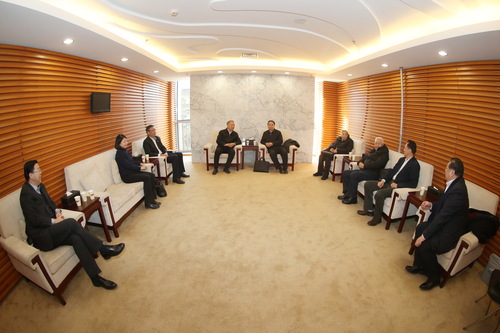On December 24th, the 1st Forum on Language Intelligence and Social Development was jointly held by ACLR and Chinese Information Processing Society in BLCU. More than 40 guests from the Ministry of Education, universities, linguistics circle, machine translation field, enterprises, think tanks and media attended the forum. The Forum was hosted by Liu Ting, Professor at Harbin Institute of Technology.

With the rapid development of AI, language intelligence robots have been increasingly involved in all areas of human life. We are now witnessing the huge social impact brought by the development of language intelligence. However, major problems rose for the government, society and scholars to solve as to how to rationally understand the influence of language intelligence, make correct and timely response in order to support the healthy development of language intelligence industry, and guarantee the social benefits with the development of language intelligence . In this context, Prof. Li Yuming, Director of ACLR, and Prof. Liu Ting, member ofthe Expert Panel on Artificial Intelligence Scientific and Technological Innovation of Ministry of Education initiated the Forum on Language Intelligence and Social Development. They proposed that regular meetings be held, and experts and scholars in related fields be invited to discuss the selected specific topics on the development of AI and related social hot spots.

The theme of the 1st Forum is Language Intelligence and the Future of Foreign Language Education. In recent years, the rapid development of language intelligence technology has started to challenge the human foreign language service in mass media. Whether foreign language education should be abolished or not and how much input should be made into the foreign language education have been hotly discussed. These issues have also posed problems for national educational planning and technical planning. At the forum, Tian Lixin, Director of the Department of Language Application and Department of Language Information Management, Ministry of Education, Director Li Yuming, Zong Chengqing, Professor of the Institute of Automation, Chinese Academy of Sciences, Wang Dinghua, Chairman of the Council of Beijing Foreign Studies University, and Jiang Hongxin, President of Hunan Normal University respectively delivered keynote reports focusing on the theme of the Forum.
After the keynote reports, renowned scholar Hu Zhuanglin, Li Sheng, Jiang Feng, Chairman of the Council of Shanghai International Studies University,Yang Yiming, Dean of School of Linguistic Sciences and Arts of Jiangsu Normal University, Ning Qi, Dean of School of Foreign Languages of Peking University, He Tingting, Dean of School of Computer Sciences of Central China Normal University, Luo Lin, Dean of School of Middle East Studies of BLCU, Zhang Quan, Director of Language Knowledge Processing Laboratory of the Institute of Acoustics of the Chinese Academy of Sciences, Xie Guoji, Researcher of the Research Center for World Problem of Xinhua News Agency, He Junchen, Director of the Research Center for World Problem of Xinhua News Agency, Chang Baobao, Professor of School of Electronics Engineering and Computer Science Peking University, Zhang Yue, Founder and CEO of Pigai, and other guests expressed their ideas and fully exchanged views on the theme of the forum.
The forum concluded with an important outcome, namely the 2018 Declaration of the Forum on Language Intelligence and Social Development —— “Coordinated Development of Language Intelligence and Foreign Language Education” (hereinafter referred to as “the Declaration”). The Declaration proposes that the academic community should calmly and rationally predict the future development of language intelligence technology including machine translation, scientifically evaluate its role in translation activities, effectively help the country to formulate practical foreign language development plans, and help foreign language practitioners be ready to adapt to the new situation. The Declaration calls for the language intelligence community, the ethics community, related sectors and people to establish a “Language Intelligence Ethics Committee” in order to ensure language intelligence develops within the frame of human ethics and to define the moral and legal boundaries for the application of language intelligence technology.